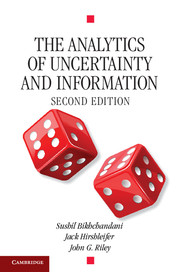Book contents
- Frontmatter
- Contents
- Acknowledgments
- In Memoriam
- Introduction
- Part I
- Part II
- 5 Information and Informational Decisions
- 6 Information and Markets
- 7 Strategic Uncertainty and Equilibrium Concepts
- 8 Informational Asymmetry and Contract Design
- 9 Competition and Hidden Knowledge
- 10 Market Institutions
- 11 Long-Run Relationships and the Credibility of Threats and Promises
- 12 Information Transmission, Acquisition, and Aggregation
- Index
- References
8 - Informational Asymmetry and Contract Design
Published online by Cambridge University Press: 05 August 2013
- Frontmatter
- Contents
- Acknowledgments
- In Memoriam
- Introduction
- Part I
- Part II
- 5 Information and Informational Decisions
- 6 Information and Markets
- 7 Strategic Uncertainty and Equilibrium Concepts
- 8 Informational Asymmetry and Contract Design
- 9 Competition and Hidden Knowledge
- 10 Market Institutions
- 11 Long-Run Relationships and the Credibility of Threats and Promises
- 12 Information Transmission, Acquisition, and Aggregation
- Index
- References
Summary
The theme of this chapter is informational asymmetry, which is not the same as the differences of beliefs considered at various points in earlier chapters. Beliefs may differ without there being a consensus that any single person's opinions are intrinsically superior to anyone else's. In some situations, however, it will be clear to all parties involved that some of them are better informed than others. When a principal employs an agent to carry out actions whose outcomes are uncertain – for example, when an absentee landlord engages a farm manager – the latter will evidently be in a better position to know about any shirking or opportunistic behavior he chooses to engage in. As another example, an expert jeweler will evidently be more familiar with the quality of the diamonds he offers for sale than will an ordinary prospective purchaser. We will be considering the first type of situation in Section 8.1 under the heading of hidden actions or moral hazard. Sections 8.2 and 8.3 explore aspects of the second type of situation, the problem of hidden knowledge or adverse selection. In each case the challenge facing the lesser-informed party is to design an incentive scheme (a contract) aimed at mitigating the effects of informational asymmetry.
The primary focus in this chapter will be on the choices made (the contracts designed) by a less well-informed decision maker or principal who has monopoly power. In the case of hidden actions, introducing competition among principals affects the analysis in only a minor way (see Exercise 8.1.2). On the other hand, in the case of hidden knowledge, when a number of less-informed transactors compete with one another, subtle issues arise regarding the nature of equilibrium. For this reason we defer a discussion of competition and hidden knowledge until Chapter 9.
- Type
- Chapter
- Information
- The Analytics of Uncertainty and Information , pp. 308 - 342Publisher: Cambridge University PressPrint publication year: 2013



